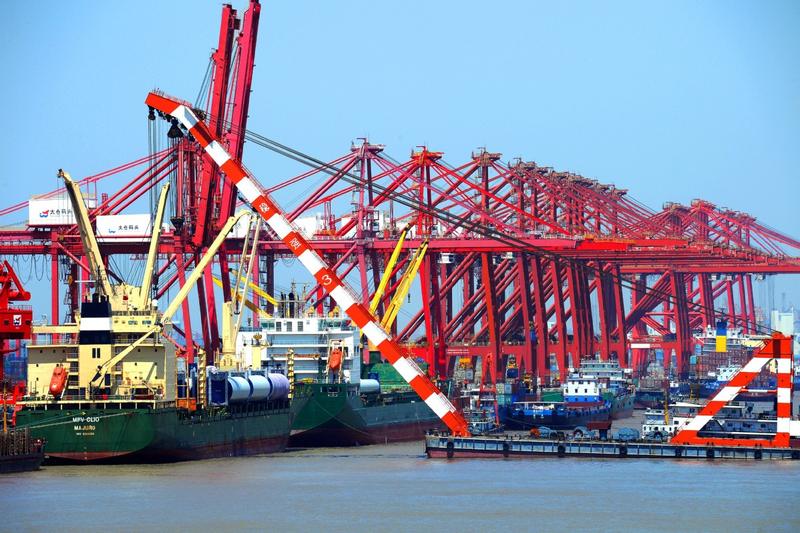 Cargo is loaded onto ships in Taicang port, Jiangsu province, in May. (JI HAIXIN / FOR CHINA DAILY)
Cargo is loaded onto ships in Taicang port, Jiangsu province, in May. (JI HAIXIN / FOR CHINA DAILY)
New import processes of Customs clearance in Taicang port and Suzhou are helping businesses in the Yangtze River Delta region to cut costs substantially.
For instance, Jiangsu Huida Supply Chain Management Company saves at least 200,000 yuan (US$30,260) in logistics costs every month.
The company imports more than 1,000 TEUs (twenty-foot equivalent units, a measure of containers used by the shipping industry) of wood planks a month. Until recently, it used to transport the planks from Shanghai's Yangshan port to Taicang by truck.
Now, it ships the goods directly from Yangshan port to Taicang port after submitting the Customs clearance documents to Taicang Customs. Barges ply between the two ports under the service name of "Taicang Express". They sail every eight hours.
After the integration of Customs procedures, all the companies exporting goods can also ship the goods from Taicang port to Yangshan port after they are released by Taicang Customs. The goods then can be shipped abroad from Yangshan port without any further procedures
ALSO READ: Customs cracks 3.9b-yuan diamond smuggling case
"The imported goods will be inspected by the Yangshan Customs before they are released," said Wei Yujun, general manager of Huida. "Then they'll be transported from the Yangshan port to Taicang port by barge."
While the goods pass through two Customs, Huida just needs to submit the documents to Taicang Customs and wait for the goods there. "Compared with transporting by barge, transporting by truck was more expensive and time-consuming," Wei said.
"With the integration of Shanghai-Taicang Customs clearance and inspection, we can save about 200 yuan in transportation expense on each container. The company's production efficiency will also be greatly improved with the clearance procedures simplified."
After the integration of Customs procedures, all the companies exporting goods can also ship the goods from Taicang port to Yangshan port after they are released by Taicang Customs. The goods then can be shipped abroad from Yangshan port without any further procedures.
Before the integration, about 40,000 commuter trucks transported goods between Yangshan port and the neighboring cities in the southern parts of Jiangsu province, including Taicang, every day.
As the nearest port to the estuary of the Yangtze, the ice-free Taicang port has a coastline of 38.8 kilometers. Titled a "golden port "of the lower reaches of the Yangtze, it also serves as a turning basin for ships with weights of up to 50,000 tons.
The Taicang port signed a cooperation agreement with Shanghai as early as 2014 and initiated 41 routes from the port to Shanghai and the Zhoushan port in Ningbo to promote the integration of the ports in the delta.
READ MORE: Customs efforts open windows for exporters
Chen Kang, deputy director of Taicang Customs, said that the integration of Customs' clearance and inspection is an essential part of the country's Yangtze River Delta Integration Strategy.
"Apart from saving time and logistics expenses, the integration can ease Shanghai's congestion and its pressure as the country's international shipping center."
Zhou Xiaohe, deputy director of the Taicang Port Administrative Committee, said that the port will deepen cooperation with shipping enterprises and major ports in the Yangtze River Delta region, such as Shanghai port and Zhoushan port.
"We will promote information exchange with those ports and continue to improve our ability to serve the regional economy," she said.


